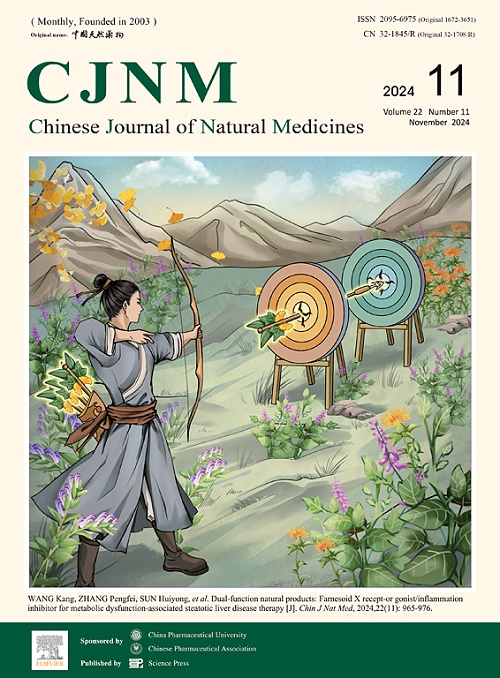Pristimerin induces Noxa-dependent apoptosis by activating the FoxO3a pathway in esophageal squamous cell carcinoma
IF 4.9
2区 医学
Q1 INTEGRATIVE & COMPLEMENTARY MEDICINE
引用次数: 0
Abstract
Pristimerin, which is one of the compounds present in Celastraceae and Hippocrateaceae, has antitumor effects. However, its mechanism of action in esophageal squamous cell carcinoma (ESCC) remains unclear. This study aims to investigate the efficacy and mechanism of pristimerin on ESCC in vitro and in vivo. The inhibitory effect of pristimerin on cell growth was assessed using trypan blue exclusion and colony formation assays. Cell apoptosis was evaluated by flow cytometry. Gene and protein expressions were analyzed through quantitative reverse transcription-polymerase chain reaction (qRT-PCR), Western blotting, and immunohistochemistry. RNA sequencing (RNA-Seq) was employed to identify significantly differentially expressed genes (DEGs). Cell transfection and RNA interference assays were utilized to examine the role of key proteins in pristimerin?s effect. Xenograft models were established to evaluate the antitumor efficiency of pristimerin in vivo. Pristimerin inhibited cell growth and induced apoptosis in ESCC cells. Upregulation of Noxa was crucial for pristimerin-induced apoptosis. Pristimerin activated the Forkhead box O3a (FoxO3a) signaling pathway and triggered FoxO3a recruitment to the Noxa promoter, leading to Noxa transcription. Blocking FoxO3a reversed pristimerin-induced Noxa upregulation and cell apoptosis. Pristimerin treatment suppressed xenograft tumors in nude mice, but these effects were largely negated in Noxa-KO tumors. Furthermore, the chemosensitization effects of pristimerin in vitro and in vivo were mediated by Noxa. This study demonstrates that pristimerin exerts an antitumor effect on ESCC by inducing AKT/FoxO3a-mediated Noxa upregulation. These findings suggest that pristimerin may serve as a potent anticancer agent for ESCC treatment.
Pristimerin通过激活食管癌FoxO3a通路诱导noxa依赖性细胞凋亡
春苔素是一种存在于紫藤科和希波克拉底科的化合物,具有抗肿瘤作用。然而,其在食管鳞状细胞癌(ESCC)中的作用机制尚不清楚。本研究旨在探讨pritimerin在体外和体内对ESCC的作用及其机制。采用台盼蓝排斥法和集落形成法评价了春素对细胞生长的抑制作用。流式细胞术检测细胞凋亡情况。通过定量逆转录聚合酶链反应(qRT-PCR)、Western blotting和免疫组织化学分析基因和蛋白的表达。采用RNA测序(RNA- seq)技术鉴定显著差异表达基因(DEGs)。利用细胞转染和RNA干扰实验检测了pritimerin ?中的关键蛋白的作用。年代的效果。建立异种移植瘤模型,评价pritimerin的体内抗肿瘤效果。pritimerin抑制ESCC细胞生长,诱导细胞凋亡。Noxa的上调对pritimerin诱导的细胞凋亡至关重要。Pristimerin激活叉头盒O3a (FoxO3a)信号通路,触发FoxO3a向Noxa启动子募集,导致Noxa转录。阻断FoxO3a可逆转pritimerin诱导的Noxa上调和细胞凋亡。pritimerin在裸鼠中抑制异种移植肿瘤,但这些作用在Noxa-KO肿瘤中基本被否定。此外,pritimerin的体外和体内化学增敏作用是由Noxa介导的。本研究表明,pritimerin通过诱导AKT/ foxo3a介导的Noxa上调,在ESCC中发挥抗肿瘤作用。这些发现表明,pritimerin可能作为ESCC治疗的一种有效的抗癌剂。
本文章由计算机程序翻译,如有差异,请以英文原文为准。
求助全文
约1分钟内获得全文
求助全文
来源期刊

Chinese Journal of Natural Medicines
INTEGRATIVE & COMPLEMENTARY MEDICINE-PHARMACOLOGY & PHARMACY
CiteScore
7.50
自引率
4.30%
发文量
2235
期刊介绍:
The Chinese Journal of Natural Medicines (CJNM), founded and sponsored in May 2003 by China Pharmaceutical University and the Chinese Pharmaceutical Association, is devoted to communication among pharmaceutical and medical scientists interested in the advancement of Traditional Chinese Medicines (TCM). CJNM publishes articles relating to a broad spectrum of bioactive natural products, leading compounds and medicines derived from Traditional Chinese Medicines (TCM).
Topics covered by the journal are: Resources of Traditional Chinese Medicines; Interaction and complexity of prescription; Natural Products Chemistry (including structure modification, semi-and total synthesis, bio-transformation); Pharmacology of natural products and prescription (including pharmacokinetics and toxicology); Pharmaceutics and Analytical Methods of natural products.
 求助内容:
求助内容: 应助结果提醒方式:
应助结果提醒方式:


